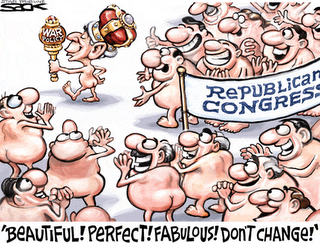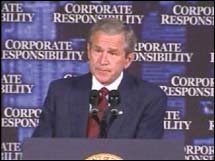
As anyone who had a middle school civics class remembers, the legislative, judicial and executive branches of the government are set up so that each both limits and counters the powers of the other two through an architecture called “checks and balances.” Today however, Congress has almost completely abdicated its role, while President Bush has claimed powers for himself more at home in a monarchy than in a representative democracy.
Mr. Bush has vetoed precisely zero pieces of legislation passed by Congress, which is unprecedented for a commander in chief in his sixth year in office. Even when he has threatened a veto unless Congress meets certain budget requirements, the nation's chief executive has still approved 100% of the bills that Congress has sent him, whether or not they have met those conditions, and no matter what outrages they contain.
Is it because Congress is now sending the President bills with which he agrees entirely? No, it is not. Instead, Mr. Bush has perverted the original intent of something called a signing statement to effectively refuse to enforce elements of legislation that he signs into law, but with which he disagrees.
To date, President Bush has claimed the authority to disobey more than 750 separate laws, ranging in subject from the shielding of whistle-blowers to protection from political interference for scientific research to prohibitions on torture. Worse, Mr. Bush has failed to properly inform Congress of a string of civil liberties-abridging programs that the legislature should be overseeing, such as rendition of terrorism suspects to foreign countries for interrogation, warrantless NSA surveillance of domestic phone calls and most recently, the tracking of international monetary movement through SWIFT. As Constitutional law scholar Jonathan Turley states, it’s getting damned hard to figure out exactly “what the President thought he was swearing to when he took the oath of office to uphold the Constitution and our laws.”
Compounding the President’s misapprehension of his powers under the Constitution is the fact that the Republican-controlled Congress has thoroughly abdicated its oversight role. In the Senate, Judiciary Committee Chairman Arlen Specter of Pennsylvania has cobbled together a shameless piece of legislation that would morph the current legal requirement for the president to consult the FISA Court on all clandestine surveillance with national security implications into simply an “option” with retroactive amnesty for any and all who had broken the law up until now.
While Specter’s latest betrayal of the American people is still only in the “proposed legislation” category, yesterday, the House followed his craven example and rammed through a resolution declaring that oversight had taken place on the SWIFT financial surveillance and condemning the New York Times, the Los Angeles Times and the Wall Street Journal for reporting on it.
That’s right: Despite the fact that there has been zero documented oversight on this program, the Republicans forced passage of a resolution stating that there had been oversight, that the program was just fine and dandy from a constitutional perspective, and that those who reported on the lack of oversight were enemies of Mr. Bush’s “War on Terror.”
We have now officially entered territory in which the word “Orwellian” applies to the here and now, and not to some future state we hope to avoid. We have left the relative innocence of patronage, corruption and wastefulness which we can normally expect to ascribe to Congress, for an uncertain future in which the fundamental system of government in the United States is profoundly threatened.
This is not alarmism. This is fact.
Whether you agree with the policies of this president or not, if this Republican-held Congress will not do it’s job and you cherish the form of government that makes this nation special and unique, it is high time to throw the bastards out.
Congress’s function is not to serve as presidential lap dog. Remember that in November.





